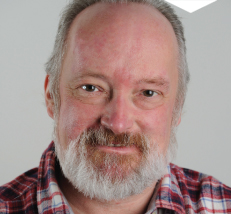 DEAN’S REPORT
DEAN’S REPORT
Professor Don Ross
The rate of new postgraduate enrolments ticked upward, and as of 2014 stands at a third higher than it did in 2008. The faculty set a new record for grant and contract income, and for publication outputs.
A primary strategic goal of the Faculty of Commerce is to organise most academic staff into thematic research units. This offers several benefits. First, a strong research unit is more likely to attract significant grants and contracts. Second, research units with international visibility attract world-class graduate students. Third, graduate students enjoy the network effects that help them succeed, and are apprenticed in the team approach to research that is characteristic of contemporary science. Fourth, research units can establish institutional relationships with businesses and non–governmental organisations (NGOs) that have material interests in the units’ agendas, and can thereby create working partnerships among academia, business and organised citizenry.
Economists recognise these elements as crucial engines of growth and innovation.A strong research unit very much resembles an entrepreneurial small business, with all the dynamism and engagement that comparison implies.
The faculty now has two dedicated postgraduate training institutes in addition to the long-established Graduate School of Business (GSB). The Graduate School for Development Policy and Practice (GSDPP), launched in late 2012, welcomed its first cohort of executive master’s students in early 2014. A consortium of funders from the national financial services sector joined forces with the Western Cape Government to establish the African Institute for Financial Markets and Risk Management (AIFMRM) (see more), which will be the first consolidated entity on the continent to offer master’s and doctoral qualifications in quantitative finance, investment banking and risk management.
A review of highlights of research unit activities over the past year provides a sense of the diverse range of work, spanning 21st-century priorities in business and economics, that makes our faculty the leading hub of commercial scholarship in Africa.
The Institute for Monitoring and Evaluation has completed contract research in the areas of literacy and extended curriculum programmes. It is currently leading an innovative global Astronomy for Development programme.
The Development Policy Research Unit (DPRU) continued to combine academically credible research with high-level policy impact. Achievements in 2013 included research into the impact of minimum wages and enforcement on general employment, wages and hours of work in South Africa; skills needed at the workplace; and understanding the African jobs challenge. The DPRU remains a key partner in the Africa Growth Initiative at the Brookings Institution in the USA. Towards the end of 2013, the unit engaged in a World Bank initiative as the Sub-Saharan African partner for the Jobs Knowledge Platform.
The UCT Unilever Institute of Strategic Marketing released two landmark research studies. The Majority Report shatters longstanding misconceptions about South Africa’s 21 million ”survivor households” living on less than R25 000 per month and is the first comprehensive cross-disciplinary study into this market segment. Another study, 4 Million and Rising, tracks the dizzying dynamics of South Africa’s new black middle class.
The Environmental Economics Policy Research Unit (EPRU) emphasised two main avenues of exploration. The first was into conservation, specifically the impacts of conservation zones on nearby communities and the optimal pricing of entry into national parks. The second concerned climate change and behaviour.
The Centre for Actuarial Research launched Tools for Demographic Estimation at the “27th International Population Conference” in Busan, South Korea. This work, funded by the United Nations Population Fund, sets out state-of-the-art methods of estimating demographic parameters from limited and deficient data – the kind of data characteristic of Africa and other poor and emerging regions.
Among the activities of the Research Unit for Behavioural Economics and Neuroeconomics (RUBEN) were two studies in Cape Town townships. RUBEN teamed up with the Southern African Sustainable Development Initiative (SASDI) Foundation, Knowledge Pele and Georgia State University to study the rollout of new crèches in Mfuleni, and with the National Responsible Gambling Programme to study the extent and consequences of unlicensed gambling in Khayelitsha. RUBEN researchers also worked with the Western Cape Government to develop interventions to promote after-school programmes, healthy lifestyles among teen girls, recycling in the city business district, and safe behaviour by youth in Cape Town townships. Each of RUBEN’s two National Research Foundation (NRF) A-rated researchers (Professor Don Ross and Professor Harold Kincaid) published a book with a leading international publisher.
A strong research unit very much resembles an entrepreneurial small business, with all the dynamism and engagement that comparison implies.
A nascent unit incubating within RUBEN, the Development Unit for New Enterprise (DUNE), in partnership with the Manufacturing, Engineering and Related Services Sector Education and Training Authority, hosted an international colloquium on technology-based entrepreneurship in 2014, following a successful national colloquium in 2013. In collaboration with the SASDI Foundation, DUNE raised two tranches of funding to conduct community-needs analysis intended to establish an early-childhood development hub in New Crossroads, and additional funds for equipping the Mfuleni Computer Centre, a township-based educational resources facility. DUNE worked with the UCT Angel Fund to help raise the funding required to run training programmes for a total of 27 township entrepreneurs.
The Centre for Information Technology and National Development in Africa (CITANDA) found its research emphasis continuing to shift toward M4D (Mobile Communication for Development) – how mobile technologies drive development, governance and innovation. Apart from its focus on larger research issues and projects, one tiny mobile application developed within CITANDA’s Samsung–UCT Mobile Innovation Laboratory to teach English-speaking South Africans basic Xhosa/Zulu/Tswana phrases, is averaging well over 100 downloads daily.
It was a year of threes for the Southern African Labour and Development Research Unit (SALDRU). The third wave of the National Income Dynamics Survey (NIDS) was publicly released and public downloads of NIDS data passed the 3 000 mark (see more). Associate Professor Ingrid Woolard, a NIDS principal investigator, was asked to serve on the National Tax Review Commission by the Minister of Finance. The Poverty Action Lab, J-PAL Africa, celebrated its third year, with Laura Poswell taking over a well-established organisation as its second executive director. Dr Vimal Ranchhod, a chief research officer, was awarded a Y1-rating by the National Research Foundation (NRF). He is the third SALDRU researcher to earn this rating as one of South Africa’s promising young researchers.
these collaborative and institutional-scale projects went on amidst highly productive years for individual researchers.
DataFirst opened its new Secure Data Service, which houses a version of the NIDS with global positioning systems information. It has also acquired administrative data from the Department of Basic Education. A new version of the Post-apartheid Labour Market Series was released with wage information stretching from 1994 to 2012.
Professors Mike Morris and Raphael Kaplinsky and Dr David Kaplan of the unit for Policy Research in Industry, Services and Manufacturing (PRISM) produced a book titled Making the Most of the Commodities Boom in Sub-Saharan Africa. Professor Lawrence Edwards and Harvard University’s Professor Robert Lawrence published a book and a policy brief with the Petersen Institute for International Economics on causes of recent employment shifts in the United States. Professor Morris and Dr Cornelia Staritz completed a large research project on Global Value Chains and Ownership in the Madagascar Apparel Industry, and Professor Morris co-authored with Professor Anthony Black a report on Industrial Policy Options for the South African Customs Union. The Graduate School of Development Policy and Practice (GSDPP) established a research partnership with the Effective States and Inclusive Development Research Centre at the University of Manchester. The programme is implemented jointly with Harvard University’s Kennedy School of Government, India’s Institute of Economic Growth, Bangladesh’s BRAC Development Institute, the Centre for Democratic Development in Ghana and the University of Malawi. The GSDPP’s contributions include an analytical overview of South Africa’s evolving political settlement in comparative perspective, with particular attention to the influence of inequality on governance and political stability, and research in partnership with humanities researchers on the politics and governance of basic education in South Africa.
Outside the research units, the faculty’s departments promoted a range of additional scholarship. The GSB published a record 48 publications in 2013. Academics in the College of Accounting presented 10 papers at the biennial “South African Association of Accountants/International Association for Accounting Education and Research Conference”. The first edition of the college’s new electronic journal, Accounting Perspectives in Southern Africa, was published. Other projects include the adjudication of the EY Excellence in Integrated Reporting Awards and 2013 saw the appointment of a staff member to the board of the Global Reporting Initiative.
The Tax Section of the Department of Finance and Tax is actively engaged in a four-year research project funded by the Research Council of Norway titled Sustainable Tax Governance in Developing Countries through Global Tax Transparency.
Researchers in the Department of Information Systems secured an NRF grant of almost R1 million to explore the impact of mobile technology and public access on collective empowerment among the urban poor, and a South Africa–Tanzania research agreement to explore the role of ICTs in empowering women in rural areas. The department was chosen as the lead partner in the more than €3 million Enterprise Systems Education for Africa project to research and develop an enterprise system education programme for the African continent, linking up tertiary institutions from 10 African countries.
All these collaborative and institutional-scale projects coincided with highly productive years for individual researchers in the other departments and sections of the faculty, including the schools of Economics and Management Studies (Actuarial Science, Organisational Psychology, Marketing, Business Communication and Entrepreneurship).


